

Mafia Commission Trial. The initial defendants included: as well as their subordinates, Aniello "The Lamb" Dellacroce, (a.k.a.
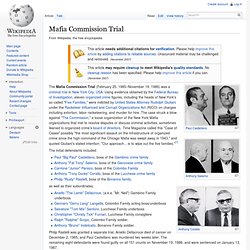
"Mr. Neil") Gambino Family underbossGennaro "Gerry Lang" Langella, Colombo Family acting boss/underbossSalvatore "Tom Mix" Santoro, Lucchese Family underbossChristopher "Christy Tick" Furnari, Lucchese Family consigliereRalph "Ralphie" Scopo, Colombo Family soldier,Anthony "Bruno" Indelicato, Bonanno Family soldier. Philip Rastelli was granted a separate trial, Aniello Dellacroce died of cancer on December 2, 1985, and Paul Castellano was murdered two weeks later.
Background[edit] The Federal Bureau of Investigation (FBI) had long pursued members of the New York organized crime families through a number of methods, including undercover informants and different types of surveillance. Genovese crime family. Finding new ways to make money in the 21st century, the Genovese family took advantage of lax due diligence by banks during the housing spike with a wave of mortgage frauds.
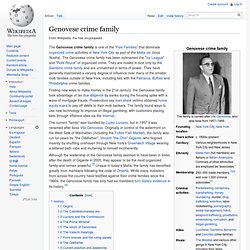
Prosecutors say loan shark victims obtained home equity loans to pay off debts to their mob bankers. The family found ways to use new technology to improve on illegal gambling, with customers placing bets through offshore sites via the Internet. The current "family" was founded by Lucky Luciano, but in 1957 it was renamed after boss Vito Genovese.
Originally in control of the waterfront on the West Side of Manhattan (including the Fulton Fish Market), the family was run for years by "the Oddfather", Vincent "the Chin" Gigante, who feigned insanity by shuffling unshaven through New York's Greenwich Village wearing a tattered bath robe and muttering to himself incoherently. Arnold Rothstein. According to crime writer Leo Katcher, Rothstein "transformed organized crime from a thuggish activity by hoodlums into a big business, run like a corporation, with himself at the top.
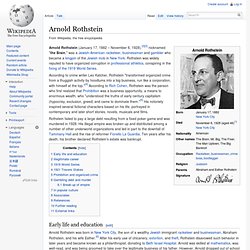
"[4] According to Rich Cohen, Rothstein was the person who first realized that Prohibition was a business opportunity, a means to enormous wealth, who "understood the truths of early century capitalism (hypocrisy, exclusion, greed) and came to dominate them. "[5] His notoriety inspired several fictional characters based on his life, portrayed in contemporary and later short stories, novels, musicals and films. Rothstein failed to pay a large debt resulting from a fixed poker game and was murdered in 1928. Early life and education[edit] While still a child, Rothstein began to indulge in gambling, but no matter how often his father scolded him for shooting dice, Rothstein would not stop.
Illegitimate career[edit] 1919 World Series[edit] 1921 Travers Stakes[edit] Prohibition and organized crime[edit] Castellammarese War. Background[edit] Mafia operations in the United States in the 1920s were controlled by Giuseppe "Joe The Boss" Masseria, whose faction consisted mainly of gangsters from Sicily, and the Calabria and Campania regions of Southern Italy.
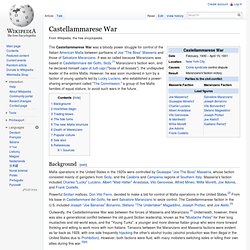
Lucky Luciano. Early life[edit] Salvatore Lucania was born on November 24, 1897 in Lercara Friddi, Sicily.[3][4] Luciano's parents, Antonio and Rosalia Lucania, had four other children: Bartolomeo (born 1890), Giuseppe (born 1898), Filippia (born 1901), and Concetta.
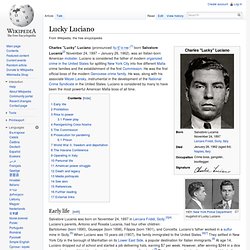
Luciano's father worked in a sulfur mine in Sicily.[5] When Luciano was 10 years old (1907), the family immigrated to the United States.[6][7] They settled in New York City in the borough of Manhattan on its Lower East Side, a popular destination for Italian immigrants.[8] At age 14, Luciano dropped out of school and started a job delivering hats, earning $7 per week. However, after winning $244 in a dice game, Luciano quit his job and went to earning money on the street.[5] That same year, Luciano's parents sent him to the Brooklyn Truant School.[9] While a teenager, Luciano started his own gang. It is not clear how Luciano earned the nickname "Lucky".
Five Points Gang. The Five Points[edit] A slum tour through the Five Points in an 1885 sketch Gambling dens and brothels were numerous in the Five Points area, and it was considered a dangerous destination, where many people had been mugged, particularly at night.
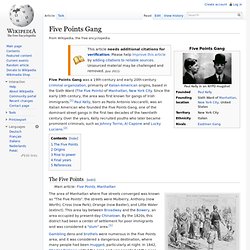
In 1842, Charles Dickens visited the area and was appalled at the poor living conditions in substandard housing.[1] In that decade, various church groups worked to end the vices in the district to help its many poor families who lived there. The Sixth Ward had a reputation as an area with a corrupt political process, more true particularly after the American Civil War. In one election, the total number of ballots filed was higher than the number of registered voters in the area.
Origins[edit] By the 1870s a wave of Italian and Eastern European Jewish immigrants were settling into the area. Rise to power[edit] Biff Ellison, a former member and would-be leader of the Five Points Gang.